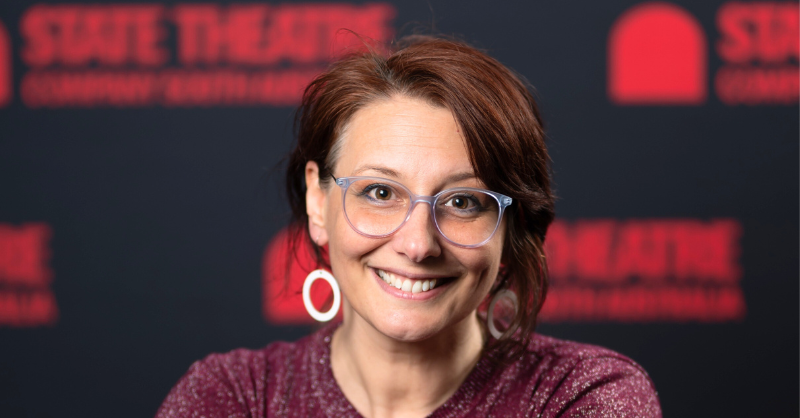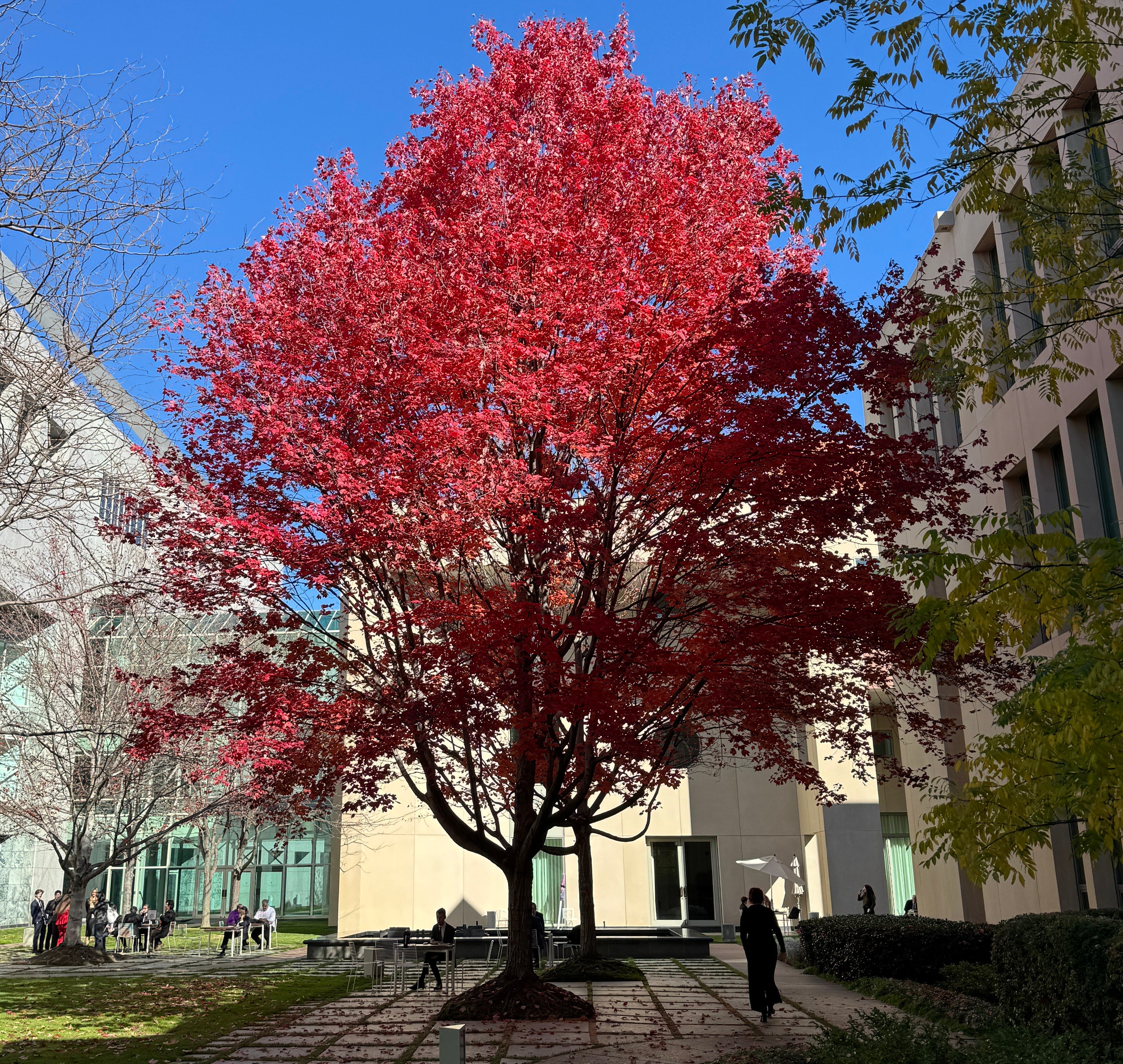In partnership with CEW member Jane Hansen AO, Chief Executive Women offers five women working...
"Stop thinking. Just do it" - CEW Scholar, Petra Kalive shares her reflections
In partnership with CEW member Jane Hansen AO, Chief Executive Women offers five women working within the arts industry an incredible opportunity to participate in the bespoke CEW Leaders Program, developed to inspire and equip women to fulfil their leadership potential.
In 2023, Petra Kalive was awarded the Hansen CEW Leaders Program for the Arts Scholarship. She has since gone on to be appointed as the new Artistic Director of the State Theatre Company of South Australia.
Read on as Petra reflects on her scholarship experience, her journey as a woman leading in the arts industry, and her advice to anyone questioning if they should apply for a CEW scholarship.

Petra, congratulations on being appointed as the Artistic Director of the State Theatre Company of South Australia. Is there anything from your scholarship experience that you will action within your new role?
All the work that we did in the in the CEW Leaders Program (with the Hansen CEW Leaders Program for the Arts Scholarship) on our strengths and values forms a bedrock for me in the role I currently hold. Since the course, I am no longer embarrassed about the skills which are not my strengths and happily lean into the strengths that others have.
Now I ask more questions. I ask better questions. I ask do you want my answer now, or do you want me to think about it? I back myself. I give myself permission to remain present despite discomfort. I remind myself and others that the past is not the future. I am aware, on a very deep level, of what is driving me and how I want to impact the world. I know I cannot do it alone.
In the corporate world, the arts industry can sometimes feel forgotten, what does a career in the arts mean to you?
I think the arts has the power to change the world. I really believe the stories we tell define us, connect us and the right story told at the right time has the power to transform us. Throughout my career, I’ve witnessed how stories shape our cultural conversations and create ripple effects across entire communities. A career in the arts, for me, is about helping people—especially in these increasingly isolated times—feel more connected, more seen, and more engaged in complex conversations.
In uncertain times, people crave simple, concrete answers—things that reinforce their existing beliefs. But I see my role as gently challenging those binaries, opening pathways for compassion and understanding, while also making people laugh, cry, or experience that rare moment of awe when something truly transcendent happens on stage.
I also think artists are wildly underestimated. Because we don’t always speak ‘corporate,’ there’s this assumption that we’re impractical, that we don’t understand budgets or complex systems. But if you’ve ever worked towards an opening night—delivering a production on time and on budget, meeting box office targets, all while navigating EHS requirements, consent policies, equity and inclusion, and ensuring the artistic quality is of the highest calibre—then, honestly, you are most likely capable of running a Fortune 500 company...
But seriously, the truth is - artists are some of the most resourceful, adaptable, and strategic thinkers out there. We create something out of nothing, turn constraints into creativity, and bring people together in ways that no spreadsheet ever could. And in a world increasingly run by algorithms and bottom lines, the ability to think outside the box, communicate ideas in a way that connects with the human and have complex conversations has never been more vital. I would highly recommend putting an artist on your board.
How do you feel about the current state of female representation in leadership positions within the Arts sector in Australia?
I feel increasingly encouraged. About 15 years ago, I was part of a collective of women who were advocating for change in the performing arts. This came out of a forum where a panel of white men in prominent leadership roles were challenged on the absence of women from that stage. The men’s response was typical – there weren’t any women, if they were any good they would be there, they didn’t see it as their job to change the status quo.
Since that time there has been a significant change in the women in leadership positions in the arts. My only concern is that most of these women are white. Our next challenge is to increase representation of people of colour to these positions – and to be clear – these people are there, these people are good enough – and it is our job to change the status quo.
How did you learn about, and come to apply for the Hansen CEW Leaders Program for the Arts Scholarship?
I had been accepted into a few leadership courses, but they were either completely unaffordable or just not quite what I was looking for. So, I was aware and actively looking for some kind of training and this scholarship popped up in my LinkedIn feed like some kind of miracle.
As soon as I saw the advertisement on LinkedIn, I thought, this is exactly what I’ve been looking for. I was really intrigued and impressed by the calibre of women in the CEW organisation, and the way the course was structured, I could still take work as a freelance artist, and financially survive all while completing a course that would positively impact my career.
Can you share an example of the most helpful encouragement you received?
I had been working in a leadership role and was feeling quite burnt out, so I decided to step down from the role. This was a very unpopular, and some would say unwise thing to do in the arts – it can be so cutthroat, once you’re ‘in’ the pressure is to stay there.
But I knew I needed to step back for a moment and reevaluate what I was doing and where I was going – and the most helpful encouragement I had was from my partner, who said, go freelance, reevaluate things.
It was so scary, stopping, but without his support, I don’t think I would have had the courage to do so. I wouldn’t have had the time or even the inclination to do the course, had I not been encouraged to give myself time to return to some basic things like values and passion for what I do.
What was your response to being announced as a recipient of the scholarship?
I was really shocked. I was so low at that point that I really thought that my career was over. This hand in the dark felt unreal – I had had so much rejection as a director that year - I was getting no work. When I got the call, I thought they had the wrong person.
And then I was filled with an incredible sense of having been seen. I know that sounds a little pathetic – but I had been feeling very invisible and really starting to doubt myself – had I chosen the right career, was I any good, was all my hard work for naught? And this call made me think – well even if the industry thinks I’m a terrible director of theatre maybe I could be a good leader somewhere else? Surely some of these skills I’ve spent over 20 years honing are transferrable?

What were you hoping to get out of the scholarship and do you feel you have achieved this?
I wanted to learn how to be a better leader—to understand how others do it and figure out what I was missing. As an artist, I was also deeply curious about women in leadership across different industries and how they navigated their roles. I learned so much from the speakers and the other women in the course—an incredible, inspirational group who were humble, generous, and unbelievably smart. I did gain insights into leadership, but not in the way I expected.
While the speakers and participants were invaluable, it was the strengths-based analysis that truly shifted my perspective. My entire career—maybe even my whole life—I had worked from a deficit model, constantly trying to improve my weaknesses. I had never truly considered what my strengths were. Doing the strengths personality profile was a revelation. Suddenly, I could see that I already possessed a unique set of skills and abilities—I had just been taking them for granted while focusing on what I lacked.
Shifting my mindset changed everything. It helped me make sense of both my successes and struggles. More importantly, it allowed me to stop playing catch-up and instead equip myself with the right people—those whose strengths complemented mine. Rather than apologising for what I couldn’t do, I now focus on what I do well and empower others to lean into their strengths.
So yes, I feel like a better leader—because I know myself better. I understand my strengths, and I no longer try to be good at everything. That shift has freed up so much mental space and, honestly, it’s liberating. I bring a unique combination of strengths, and embracing that—not trying to be everything to everyone—is what I learnt.
Did you know anything about the CEW organisation before your scholarship experience?
I didn’t know anything about CEW before beginning, but now I see the important work that they do across so many industries and as a collective for women. Although I’m not yet a CEW member, I do feel connected and part of a great enterprise which is literally changing the face of leadership in this country, while also lobbying and advocating for women and equality more broadly.
How do you think the CEW scholarships programs align towards the CEW overarching mission of “Women Leaders Empowering All Women”?
I would not have been able to afford the CEW course as a theatre worker. The CEW scholarship program empowered me and five other arts colleagues the opportunity to invest in ourselves and our leadership potential.
Those working in the arts often miss out on the privileges that women who work in large corporates get as a matter of career progression. There are serious pathways inside many of those companies now that ensure that women are supported, trained, mentored and encouraged to take the next step.
Because money is always ridiculously tight in the arts, there is very rarely an opportunity for what is seen as non-essential training or development. This scholarship program was at its very heart women leaders empowering women who are often forgotten about.
What advice would you give to someone who is second guessing themselves in applying for the scholarship?
Stop thinking about it. Just do it.
You can learn more about the
Hansen CEW Leaders Program for the Arts Scholarship


